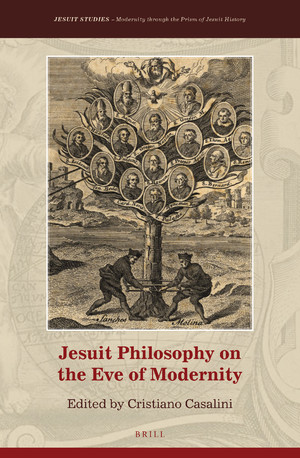I. The Landscape
- Philosophy in Jesuit Schools and Universities, Paul F. Grendler
- Uniformitas et soliditas doctrinae: History, Topics, and Impact of Jesuit Censorship in Philosophy (1550–99), Christoph Sander
II. The Disciplines
Section 2.1: Knowledge
- From Probability to the Sublime(s): Early Modern Jesuit Rhetoric; a Anti-philosophy or an Alternative Path to a Modern Idea of “Truth”?, Anne Régent-Susini
- Jesuit Logic, E. Jennifer Ashworth
- Jesuit Psychology and the Theory of Knowledge, Daniel Heider
Section 2.2: Nature and Theological Concerns
- Early Jesuit Philosophers on the Nature of Space, Paul Richard Blum
- “Accedit Theologicum argumentum”: Discussing Transubstantiation in Commenting, Aristotle; Commentarius Collegii Conimbricensis on Aristotle’s De generatione
Stefano Caroti
Section 2.3: Action
- A Juridicized Language for the Salvation of Souls: Jesuit Ethical Thought, Christoph P. Haar
- Political Thought, Erik De Bom
III. Authors
Section 3.1: The Roman College
- Francisco de Toledo: Setting a Standard for Jesuit Philosophy, Anna Tropia
- Benet Perera: the Epistemological Question at the Heart of Early Jesuit Philosophy, Marco Lamanna
Section 3.2: Madrid
- Luis de Molina: The Metaphysics of Freedom, Alexander Aichele
Section 3.3: Coimbra
- Pedro da Fonseca’s Unfinished Metaphysics: the First Systematic Jesuit Metaphysics before Suárez, António Manuel Martins
- Manuel de Góis: the Coimbra Course and the Definition of an Early Jesuit Philosophy, Mário S. de Carvalho
- Francisco Suárez: a “New” Thomistic Realism, Benjamin Hill
IV. Reverberations
- Descartes and the Jesuits, Alfredo Gatto
- John Locke and the Jesuits on Law and Politics, Elliot Rossiter
